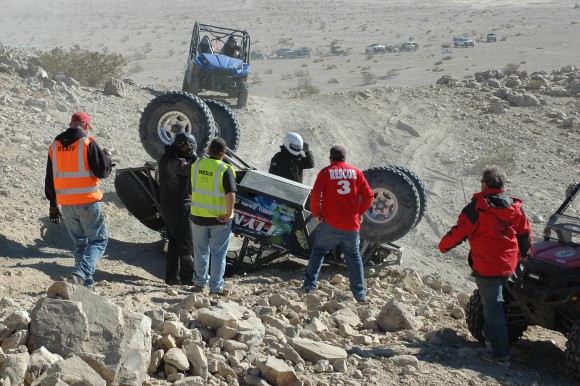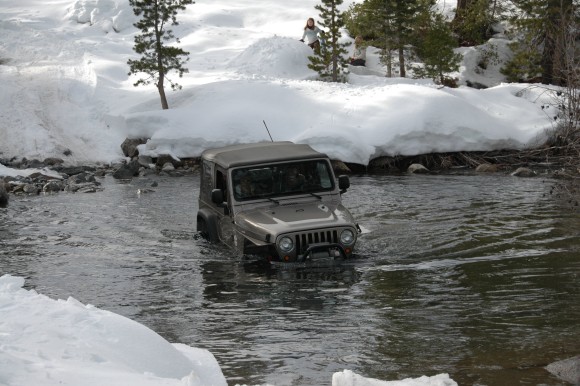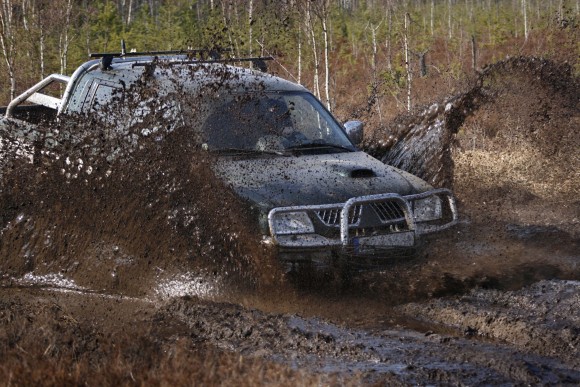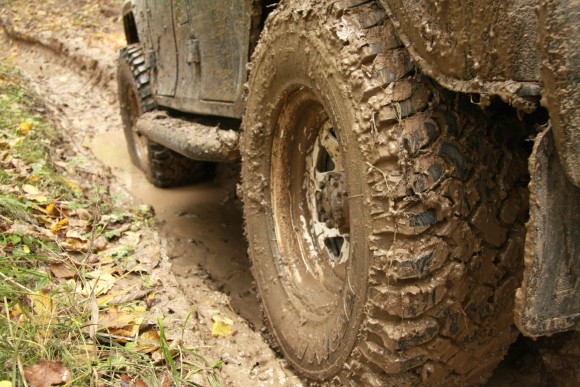How to avoid disaster off road?
When the Dirt Hits the Fan

There is nothing quite comparable to the thrill and excitement of off-roading, but it is also challenging and potentially very dangerous (as are most things fun). If you’re a frequent, or even casual, off-roader, the dirt is eventually going to hit the fan – it’s just a matter of when.
Here are a few tips to ensure you aren’t left standing three feet deep in mud when it does – or at least that you’re armed with a shovel for all the expletive you’re buried in.
Before You Even Leave the Driveway...
A huge portion of disaster management is about being prepared. Don’t take on a new trail blind and don’t fly solo. Do fill your tank and top off your fluids right before you leave, tell someone where you’re going and when you’ll be back and research the area so you know your rig is up for the challenge and you’ve packed the right gear. No matter where you’re leaving tracks, there are a few things you should always bring with you:
- A Bug Out Bag: everything you would need to survive a stint in the wild, such as food and water, an emergency blanket, gloves, medical kit, matches/lighters, flashlights, a knife, bug spray, sunscreen and pretty much anything else which will keep the elements at bay. Tom Severin, President of Badlands Off-Road Adventures in Redondo Beach, California also packs an “emergency package” with the phone numbers of local authorities and emergency services and maps with exit routes and directions to hospitals. He inspects his vehicle before every trip, doing a 360° walk around and using a checklist so he doesn’t leave anything behind.
- Tools and Quick Fixes: If you roll, get waterlogged or just break down, make sure you have all the tools, spare parts and fluids you need to get moving again. The farther from civilization you’re going, the more you’ll need to pack.
- Recovery Tools: There are a million and one truck and Jeep accessories to get you out of a pinch. May we suggest the following basics:
- Tow straps – loops not hooks, and do not use chains: if you bust one you chance the resulting shrapnel taking a bite out of you. Nylon is your best material choice.
- A roll cage – because by the time you need one, it’s too late.
- A winch – make sure it can tow at least twice the weight of your vehicle, and a ground winch anchor can be invaluable when there are no natural anchors in sight.
- A shovel – that expletive I mentioned before? If your tires are dug so deep into it that you’re resting on your axle, you’ll need this. It helps if it’s collapsible for easy storing.
- A Hi-Lift jack – whether you need to add traction to get out of the mud, get up off some debris or MacGyver a winch, these are affordable and tremendously useful.
Make sure everything is securely tied down: the last thing you need is a high-speed re-introduction to your tool box mid-rollover.
When it’s too Late to Turn Around...
“Recon, recon, recon,” says Severin. “Don’t commit yourself until you know where the trail is.”
Once you find yourself moving in an unintended direction, it’s usually too late to pull back. You feel your tires start to spin, your view is suddenly all sky and no ground or you’re forced into the sudden realization that you’re not in a boat and you only know one thing: gravity is not your friend. While you’re filling the air with some very creatively colored language, you should probably also:
In a roll or a flop
“The biggest thing is, you don’t want your arms to get out,” says Michael Finch, certified operator by the California Tow Truck Association and 4Wheel Parts suspension specialist. “Best thing to do … is to plant your feet, brace yourself and hold on.”
- If you’re the driver, keep your thumbs out of the spokes of the steering wheel or a sudden jerk could result in immediately painful consequences.
- Absolutely do not try to reach out and prevent your vehicle from falling. As much as you love your 4x4, it will not hesitate to team up with that jerkoff gravity and crush you.
- If you have time, cut the engine before you fall.
When you’re losing traction
- If you’re starting to spin in mud, you can gain more traction by turning your wheels back and forth slightly, before you’re forced to a stop.
- If you’re digging in, release the gas or you’ll be in deeper.
- If you’re sliding, terrain and conditions are everything. The overarching moral is: slow down, focus on steering yourself to safety.

Mid-ford
Fording is one of the most potentially disastrous aspects of off-roading. If you’re up the creek without a paddle, you need to think fast and play it safe, plus:
- "If you’re in the middle of a crossing and the water is above the exhaust but below the intake, don’t shut off the engine,” says Finch. A good rule of thumb is to keep the water below bumper height. “If your headlights go under, kill the engine.”
- This is where you’ll be glad you brought a buddy. If you’ve taken all of the necessary precautions before a ford, you can easily toss out a tow rope or winch to be pulled out of the water.
- If the water reaches over your doors, the pressure is going to hold them shut until it’s just as wet inside as out. Make sure you have your windows rolled down before you cross, so you can get out if you need to.

After You’ve Eaten It...
You’re upside down and really regretting stopping for tacos before you hit the trail. You’ve shut off the engine and made sure you’re not rolling anywhere, now how are you going to get out of this?
1. Assessing the Situation
- People first! Anyone with a potential spinal injury should not be moved, but keeping everyone safe is priority one. Bring soap notes (forms for assessing injury) in your bags when you’re preparing for a trip, suggests Severin.
- Check your surroundings: are there safety hazards like cliffs, drop-offs or water? Are you exposed to the elements? How much time do you have?
- Look for any damage to your vehicle: is your driveshaft/axle intact? Is there fluid in your engine? Anything leaking?

2. Regaining Your Footing, if Not Your Dignity
If you’re on your own, this can be extremely difficult if not impossible to pull off. The biggest things are to stay calm and take your time. A few things to keep in mind:
- If you’ve rolled or flopped, do not place yourself under the vehicle to try to lift, lower, raise or move it – no matter how many friends are holding it with you. Use the proper tools and stand back, because as you’ve already learned the hard way: crud happens. Once you’re upright again, check your engine for oil – you do not want to hydro lock your 4x4.
- If you’re dug into the ground, you need to regain traction to get out. Brush, rocks, your floor mats or pretty much anything can be placed under your tires to give them something to grip. Once you get traction again and your vehicle is crawling forward, keep a steady speed and your tires straight until you are out of the muck. Then aim for solid ground.
- If you’re waterlogged, make sure to check all of your oil-based fluids. If everything is still running smoothly, count your blessings and take it slow. Lightly ride your brakes once you get going to dry them off.
Make sure to clean up before you go. Any debris, broken glass or fluid needs to be packed up for safe disposal later.
Take it slow getting home, there may be damage to your vehicle you don’t know about, and after the day you’ve had the last thing you want is another disaster. It happened: you went for a ride and wound up in the dirt, but you survived to tell all about it. Now comes the fun part! Slap some new Jeep decals on your mud stains, pop the hood, jack up your beloved beast, and get it ready for your next adventure.
Rachel Bowes
Rachel Bowes is fresh talent on the copywriting scene, a year out of university. She spends her days immersed in the 4x4 lifestyle, writing copy for email campaigns, social media and articles like this one. In her current position with
4 Wheel Parts she’s graduated from a general understanding that cars go 'vroom' to holding debates on solid vs. independent axles.



